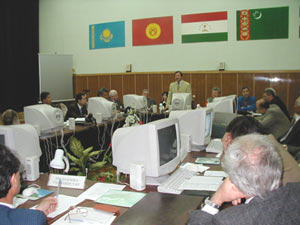
Training Activity
Proceeding from the 21st ICWC meeting, a Training center for capacity building in the Central Asian water sector was established at SIC ICWC under support of the Canadian International Development Agency. Along with raising the level of professional knowledge, the training contributes to cooperation among the riparian countries in the field of water use and management and elaboration of common approaches at the level of water specialists and decision makers.
Training of Central Asian water specialists is organized in form of training workshops for 20-30 persons (4-5 representatives from each of 5 countries), duration 5-7 days, depending on subject. In 2000-2010, the subject themes were presented by the following courses:
- Integrated Water Resource Management (IWRM);
- Transboundary river cooperation;
- Water law and policies;
- Advanced irrigated agriculture, etc.
 Along with water specialists, representatives of other water-using sectors, such as energy, ecology, drinking water supply and fishery are invited to get training. Representatives of the ministries of foreign affairs and justice that are involved in the development of interstate agreements on water sharing are invited to get training in the water law and policy workshops held with participation of experts from Great Britain (Dundee University) and Israel. Specific workshops were organized for NGO representatives in order to raise awareness among them about IWRM and the role of the general public in its implementation.
Along with water specialists, representatives of other water-using sectors, such as energy, ecology, drinking water supply and fishery are invited to get training. Representatives of the ministries of foreign affairs and justice that are involved in the development of interstate agreements on water sharing are invited to get training in the water law and policy workshops held with participation of experts from Great Britain (Dundee University) and Israel. Specific workshops were organized for NGO representatives in order to raise awareness among them about IWRM and the role of the general public in its implementation.
The Training Center practices interactive training, which is based on activating “brainstorms” among representatives of different countries and sectors with the help of experienced moderators. This promotes better consensus in the region at intersectoral and interstate levels. Proceedings and collective recommendations produced from each training workshops are disseminated among ICWC members for further distribution at a national level and for following improvement of the training system.
In order to improve training efficiency and extend local coverage, branches were established in Osh, Bishkek, and Akbarabad (Kyrgyzstan), Almaty (Kazakhstan), Khojent (Tajikistan), Urgench, Fergana, and Andizhan (Uzbekistan).
The objectives of these branches are to cover lower level specialists of water organizations, managers of WUAs and farms, train in methods improving water and land productivities through water conservation, and establish a network of demonstration plots for provision of advisory services. Over the period of 2000-2010, more than 5860 people got training in the above fields in the TC and its branches.
Number of people who got training in TC ICWC in 2000-2010
Unfortunately, in the recent years, due to lack of permanent financing, the Training Center and its branches could not operate on a regular basis.
In order to generalize the earlier accumulated training materials, SIC ICWC in partnership with the Institute UNESCO-IHE (the Netherlands) started to develop specialized curricular for training of national trainers since late 2009. The trained trainers would provide capacity building of water specialists in their respective countries on the basis of received manuals and materials.
Additional information on the ICWC Training Center can be found on the site cawater-info.net/training/ (in Russian only)